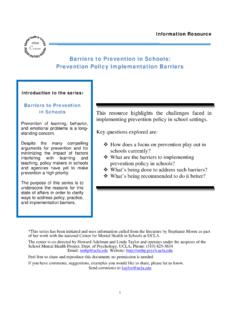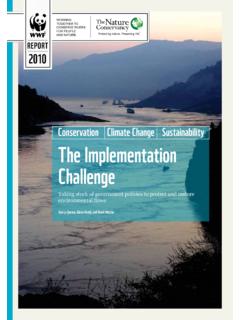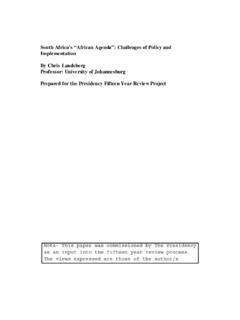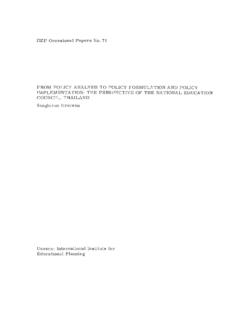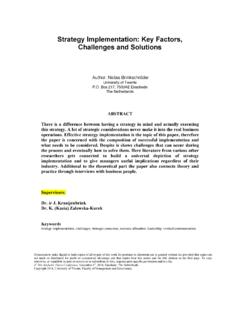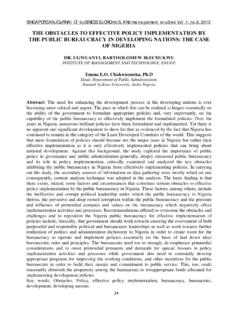Transcription of Challenges in Implementing a Competition Policy and Law ...
1 #0202 Challenges in Implementinga Competition Policy and Law:An Agenda for ActionChallenges in Implementing aCompetition Policy and Law:An Agenda for ActionChallenges in Implementinga Competition Policy and Law:An Agenda for ActionPublished by:CUTS Centre for International Trade, Economics & EnvironmentD-217, Bhaskar Marg, Bani Park, Jaipur 302 016, IndiaEmail: Website: Africa Resource Centre4th Floor, Main Post Office Building,Cairo Road, Box 37113, Lusaka, ZambiaEmail: work was carried out with the aid of a grant from theInternational Development Research Centre,Ottawa, Canadawith assistance from Ritu LodhaLayout by:Mukesh TyagiCUTS, JaipurPrinted by:Jaipur Printers P. 302 001 ISBN: 81-87222-54-9 CUTS, 2002 First edition: March 2002 Reprint: July 2002#0202 SUGGESTED CONTRIBUTION $ Should Countries IntroduceNational Competition Law?
2 10 Chapter-IIIWhat Form Should NationalCompetition Law Take?..15 Chapter-IVHow to Make the Competition Law are the InternationalCompetition to Deal with InternationalCompetition are the Pros and Cons of aMultilateral Competition s a Competition Law & Policy ?Even though the field of Competition law and Policy is evolving rapidlyand includes many different viewpoints on specific issues, it is beingincreasingly recognised that effective Competition Policy and law isimportant in shaping business culture. To understand the significance ofcompetition Policy for a developing economy, it is very important to knowwhat do we actually mean by the term Competition measures that directly affect the behaviour of enterprisesand the structure of industry constitutes Competition Policy .
3 It covers awhole raft of executive policies and even approaches, whereas the law isa piece of legislative enactment to regulate the marketplace, which canbe enforced in a court of Policy is an instrument to achieve efficient allocation ofresources, technical progress, consumer welfare and to regulateconcentration of economic power detriment to Competition . It has differentobjectives in different countries but some major themes stand out. Inmost of the countries, it aims at promoting Competition by discouraginganti-competitive behaviour. Freedom of trade, freedom of choice, accessto markets, and achievement of economic efficiency to maximise consumerwelfare are the other commonly expressed objectives of Competition role of Competition Policy has also expanded in the last two decadesto include curbing the adverse effects of government intervention in opportunities for anti-competitive behaviour may be limited inmany sectors most of the time by fierce Competition between firms,market conditions are constantly changing.
4 It cannot be guaranteed thata particular market will remain very competitive and hence lessvulnerable to anti-competitive practices in the long term. By beingcomprehensive, Competition Policy provides a ready-made, consistentframework for dealing with anti-competitive behaviour in any sector ofthe of a comprehensive Competition Policy can lead to significantadvantages to business as well as consumers. For business, such a policymeans fairness as it acts against anti-competitive practices that candrive efficient and well-run companies out of business. It ensuresconsistency because it is applied by a single authority working to a singleset of published rules and a reduction in regulation since it is proactive,efficient and effective which avoids the need to commit manpower andtime to devising new rules when new products or markets in Implementing a Competition Policy and Law w iFor consumers, an effective Competition Policy & law leads to lowerprices and improved services.
5 An improvement in the coverage ofcompetition law and a reduction in the time taken to remove barriers tocompetition mean a lot for the a domestic Competition law & Policy , it may be difficult tocontrol international anticompetitive practices like cartels etc, whichrestrict trade and adversely affect economic development. Developingcountries may be hit doubly by the international cartels: on one hand,they may pay more for certain inputs than they would if the internationalmarket was competitive and on the other hand, their efforts to build acompetitive industrial sector may be stifled (see pg-14).However, it becomes very important to consider certain issues whiledrafting a Competition Policy because the high probability of even adesirable Competition law & Policy being implemented ineffectively bythe Competition agency due to various factors such as: Lack of political will; Lack of expertise; Inefficiency, and Resource pre-drafting process should focus first on the key problems in theeconomy.
6 The most important bottlenecks that create impediments forthe growth in domestic and export markets should be identified. Arealistic assessment of the availability of financial and human resourcesshould guide the purview of the law and the nature of the and their independence, separation of functions, adequatestaffing and resource availability, and transparency are crucial foradequate Competition law enforcement in any country. An agency thathas little money and few people but an ambitious set of responsibilitiesshould be careful in identifying its initial priorities. It is also significantto develop cooperative links with other agencies at the regional and theglobal level. Competition laws should be allowed to evolve and changeto suit changing economic circumstances, while preserving the coreobjectives of Competition countries should take positive action and build their internalcapacity in the area of Competition Policy , fostering the adoption of bestpractices, making full use of the expertise accumulated by establishedcompetition agencies and taking advantage of technical assistance,advisory and training services provided by multilateral institutions.
7 Amultilateral framework for cooperation on Competition issues would betterserve the interests of developing countries than the absence of such S MehtaMarch 2002 Secretary Generalii w Challenges in Implementing a Competition Policy and LawChallenges in Implementing a Competition Policy and Law w 7 Chapter-IIntroductionThe value of Competition Policy (CP) and Competition law (CL) iswell understood in some countries, particularly in the US, whereanti-trust laws have long been recognised as a force for dynamismin the economy and the sharing of benefits between firms andconsumers. However, their value is not well understood by Policy -makers, producers or consumers in most developing countries. Inmany of these countries, Competition is an issue that has come tothe fore only because of its inclusion in the agenda of the WorldTrade Organisation (WTO).
8 At the insistence of the European Union(EU), it was included in the Doha Ministerial Declaration, November2001, and the member-states committed to begin negotiation oncompetition after the next Ministerial meeting in two years PerceptionsCP is regarded with suspicion, as just another tool for transnationalcompanies (TNCs), backed up by the governments of their richhome countries, to break into the markets of poor countries. CP isthought to benefit TNCs, which have inherent advantages becauseof their scale and scope, over domestic firms, which will be wipedout in the heat of international as a BeneficiaryConsumers in developing countries do not generally considercompetition to be an issue of any relevance, yet it is consumerswho have the most to gain from CP through lower prices, morechoice and higher quality in the goods and services that they canbuy.
9 This negative perception has held back an open and informeddebate on the benefits of Competition Policy and law at the nationallevel as well as at the international , a well-implemented Competition Policy may raise efficiencyin the economy, spurring local firms to greater efficiency andensuring that the benefits of economic growth in the economy areshared with people. A Competition Policy , rather than a Policy ofliberalisation, is a Policy to balance the risks and constrain thenegative effects of liberalisation, while providing for a predictablebusiness value of Competition Policy (CP)and Competition law (CL) is wellunderstood in some countries,particularly in the US, where anti-trust laws have long been recognisedas a force for dynamism in theeconomy and the sharing of benefitsbetween firms and , their value is not wellunderstood by Policy -makers,producers or consumers in mostdeveloping is regarded with suspicion, as justanother tool for transnationalcompanies (TNCs).
10 Consumers in developing countries donot generally consider Competition tobe an issue of any relevance, yet it isconsumers who have the most to gainfrom CP through lower prices, morechoice and higher quality in thegoods and services that they can w Challenges in Implementing a Competition Policy and LawInformation SharingThe negative perception can be changed through the exchange ofinformation and experience between developing countries, as wellas from developed to developing countries. CUTS assists thisinformation-sharing process by organising events and publishingmaterials to raise awareness and break down biases on this centralconsumer issue in developing countries. (See Annexure-I for a listof CUTS publications on Competition Policy and law)About the SymposiumA short survey on participants perceptions on CP was conductedduring a symposium held in Geneva on Competition Policy andConsumer Interest in the Global Economy on 12-13 October one-and-a-half-day event was organised by CUTS and supportedby the International Development Research Centre (IDRC), symposium was addressed by international experts andpractitioners representing different stakeholder groups: consumerorganisations, NGOs, media, academia, Policy -makers etc.



